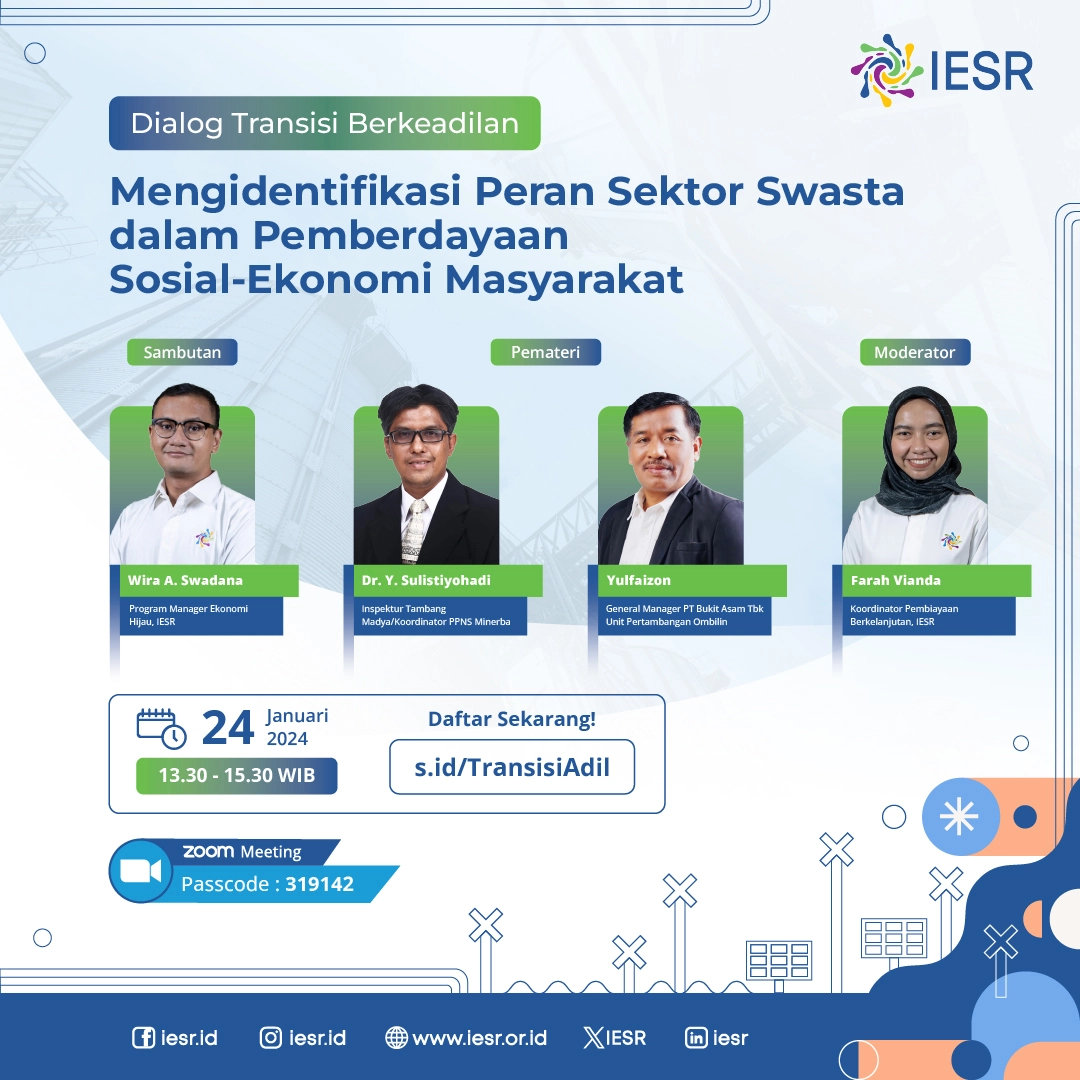
Dialogue on Equitable Transition: Identifying the Role of the Private Sector in Socio-Economic Empowerment of Communities
Replay Event
Background
Indonesia is the third largest coal producing country after India and China in 2022. According to the Ministry of Energy and Mineral Resources, Indonesia targets coal production of 694.5 million tons in 2023, 0.47% higher than the previous year’s target. As of October 2023, Indonesia’s coal production has reached 567.2 tons or 81.67% of this year’s production target. Coal in Indonesia will mostly be sold to the export market (75%-80%) and consumed domestically (20%-25%). However, with the trend of energy transition, Indonesia’s coal demand seems to be declining, one of which is from India. India decreased its coal demand from Indonesia from 8.43 million tons to 6.11 million tons as of June 2023.
In addition to the downward trend in coal demand from abroad, the Indonesian government has endorsed several commitments that will affect the use of coal going forward in line with the energy transition agenda towards renewable energy. In 2022, the Government of Indonesia passed Presidential Regulation No. 112 of 2022 on the Acceleration of Renewable Energy Development for Electricity Generation, which explicitly stipulates a ban on the construction of coal-fired power plants starting in 2030. This commitment was supported through the signing of the Just Energy Transition Partnership (JETP) agreement between Indonesia and IPG and GFANZ. Through the CIPP document, the Government of Indonesia intends to achieve peak emissions in the power sector at 290 MT CO2 and a renewable energy mix of 34% by 2030. In addition, the document also states that Indonesia should strive for an equitable energy transition process where social, economic and environmental impacts are also a concern for policy makers. The existence of national and global policies also has the potential to affect the company’s business and also the socio-economic structure of communities around mining areas.
Extractive industry activities are often the main source of local revenue, but they also cause economic, socio-community and environmental losses. With the energy transition agenda, the government plans to limit coal consumption, which will lead to faster closure of coal mines and affect local community activities. In Law No.4/2009 on Mineral and Coal Mining, post-mining activities require business actors to restore the natural environment to its original state. This is also stipulated in Law No.40/2007 which requires companies in the natural resources sector to carry out Social Responsibility activities which are widely associated with community empowerment. By integrating activities that suit the economic needs of the community with the company’s plans, it is hoped that the community can independently develop their economic activities and can be free from dependence on the company. Thus, the role of the company and local government is important for post-mining activities.
Therefore, IESR intends to invite business actors to provide information and strategies for planning successful community and environmental empowerment programs in preparation for post-mining activities. This event is also expected to strengthen post-mining planning between the government and business owners in the fair energy transition agenda.
Objective
This activity has several objectives, namely:
- To obtain and disseminate information related to post-mining reclamation programs both in terms of planning and implementation as well as the challenges faced towards an equitable transition;
- Obtain and disseminate information on the role of businesses or industries in preparing for the impact of the energy transition on the community and the surrounding environment;
- Identify collaborative forms of post-mining activities to develop based on economic potential, natural resources, and people through the implementation of a just transition;
Presentation
Reclamation and Post-Mining, Koordinator PPNS Minerba – Dr. Y. Sulistiyohadi
Reklamasi-dan-Pascatambang-Koordinator-PPNS-MinerbaReclamation and Post-Mining Ombilin1 – Yulfaizon
Reklamasi-Pasca-Tambang-Ombilin1-IESRSpeaker
-
Wira A. Swadana - Program Manager Ekonomi Hijau - IESR

